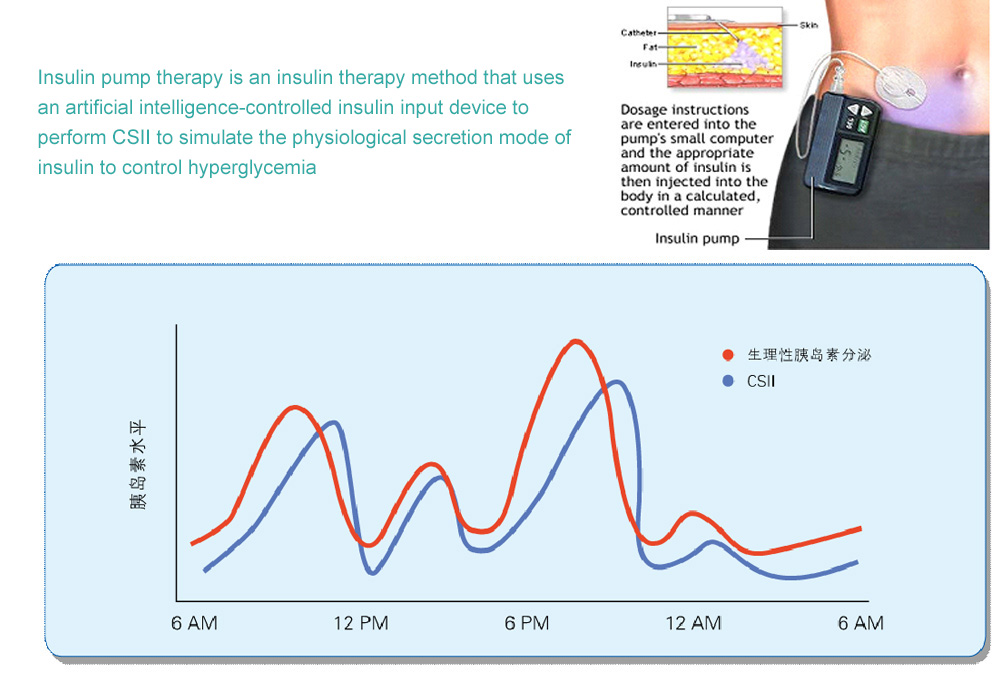Pump insulin pump therapy is an insulin input device controlled by artificial intelligence. Through continuous subcutaneous infusion of insulin, it simulates the physiological secretion mode of insulin to control hyperglycemia. It is the most accurate, simple and convenient insulin infusion system at present. It is the best means and method for the intensive treatment of diabetes. The insulin pump is composed of an artificial intelligence control system containing a microelectronic chip, a mechanical pump system driven by a battery, a medicine reservoir, and The connected infusion tube and subcutaneous infusion device consist of four parts.

Under physiological conditions, insulin secretion can be roughly divided into two parts according to the relationship with meals. One is the continuous micro-secretion that does not depend on meals, that is, basal insulin secretion. At this time, insulin is secreted in pulses with an interval of 8 to 13 minutes; the other is from after a meal. A large amount of insulin secreted by high blood sugar stimulation. The insulin pump is controlled by artificial intelligence to simulate the basal insulin secretion in the body with adjustable pulse subcutaneous infusion; at the same time, during meals, pre-meal insulin and infusion mode are set according to the type and total amount of food to control post-prandial blood sugar. The front end of the infusion line can be buried under the patient's skin. Under working conditions, the pump mechanical system receives instructions from the control system, drives the piston in the reservoir, and injects insulin into the skin.
Basal rate of insulin pump: The insulin pump can continuously input trace amounts of insulin into the body of diabetic patients to simulate the basal insulin secretion under physiological conditions
The insulin pump can set the basal rate for different periods of time according to the patient's insulin demand in different periods of the day
Insulin pumps can set different basal rates according to the patient’s daily lifestyle
Insulin pumps can provide basal rates with different ranges and increments, which can meet the basal insulin settings of more diabetic patients
Large dose of insulin pump: The insulin pump can simulate the secretion of insulin after a meal under physiological conditions by injecting pre-meal insulin during meals or snacks
The amount of insulin injected before a meal is called a large dose before a meal
The amount of insulin injected before a meal is called a supplemental high dose
If the blood sugar is not up to the standard, the islets can be added as a corrected high dose
As an insulin therapy method, insulin pump therapy has the following advantages:
Conducive to better control of blood sugar
Smooth, fast and safe control of blood sugar
Reduce the incidence of chronic complications of diabetes
Contribute to blood sugar control in special populations
Childhood or adolescent diabetes
Perioperative diabetes
Gestational diabetes
Improvement of quality of life
Indications for short-term insulin pump therapy:
Newly diagnosed type 2 diabetes patients requiring short-term intensive insulin therapy
Perioperative blood glucose control in diabetic patients
Blood glucose control in patients with stress hyperglycemia
Pregnancy with gestational diabetes or diabetes or diabetic patients planning to become pregnant
Intensive control of blood sugar in diabetic patients with long-term intensive insulin therapy
Indications for long-term insulin pump therapy:
Type 1 diabetes patients
Patients after organ transplantation
Patients with type 2 diabetes who need long-term intensive insulin therapy, especially:
Diabetes patients whose blood sugar fluctuates greatly, despite using multiple subcutaneous insulin injections, the blood sugar cannot be controlled steadily
Frequent hypoglycemia
Those with severe dawn phenomenon leading to poor overall blood sugar control
Irregular work and rest schedules and unable to eat meals on time
Those who want to improve the quality of life
Patients with gastroparesis or long eating time
The purpose of insulin pump therapy:
Insulin pump simulates physiological insulin secretion characteristics:
Simulate the basal insulin release of normal people through continuous and adjustable basal rate in time intervals
Give a large dose before meals to prevent a significant increase in blood sugar after meals
The risk of hypoglycemia in patients treated with insulin pump is relatively reduced
The basic rate of insulin pump can be set according to physiological needs and can be adjusted temporarily according to different states of the body (temporary basic rate)
The pre-meal large-dose administration mode can also be selected according to the expected meal characteristics (time, amount and ratio of nutrients, etc.)
The use of insulin pumps can achieve the overall goal of diabetes treatment
UKPDS results show that for every 1% reduction in HbA1c, the risk of any diabetes-related end-point event is reduced by 21%, so the use of insulin pumps may reduce the occurrence of chronic complications

